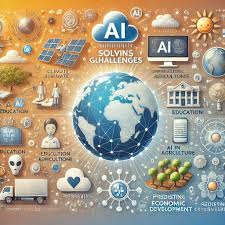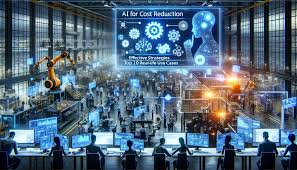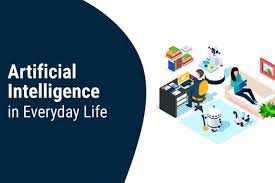
AI and Economic Growth: The Potential for Prosperity
There’s no denying that AI has the potential to drive significant economic growth. By automating repetitive tasks, optimizing supply chains, and enabling more efficient decision-making, AI can unlock new levels of productivity across industries. Let’s take a look at some key areas where AI is expected to spur economic progress:
1. Increased Productivity and Efficiency
AI can automate labor-intensive processes, allowing businesses to operate more efficiently. For example, in the manufacturing sector, AI-powered robots can handle repetitive tasks like assembly, inspection, and packaging, reducing human error and increasing output. In fields like logistics, AI can streamline supply chains, reducing costs and improving delivery times.
According to McKinsey, AI could contribute up to $15.7 trillion to the global economy by 2030 through improved productivity alone. This increased efficiency can lead to lower prices for consumers, higher profit margins for businesses, and overall economic growth.
2. Innovation and New Business Models
AI opens up new possibilities for innovation. In industries like healthcare, AI is enabling the development of personalized medicine and faster drug discovery, while in finance, AI-driven algorithms can offer more accurate risk assessments and investment strategies. Startups and established companies alike are leveraging AI to create new products and services, revolutionizing sectors and driving market expansion.
AI is also enabling new business models, particularly in the realm of “AI as a service.” Companies that provide AI solutions, cloud computing, and data analytics are seeing rapid growth, creating a ripple effect throughout the economy.
3. Enhancing Customer Experiences
With AI’s ability to analyze vast amounts of data, businesses can provide more personalized and tailored experiences for customers. AI-powered chatbots, virtual assistants, and recommendation engines are increasingly common across industries like retail, banking, and entertainment, helping companies improve customer satisfaction and loyalty.
This focus on customer experience can drive economic growth by fostering stronger consumer demand and creating opportunities for businesses to diversify and reach new markets.
4. Global Competitiveness
Nations that effectively adopt and integrate AI technologies are likely to gain a competitive edge on the global stage. Countries like the United States, China, and the European Union are already investing heavily in AI research and infrastructure to ensure they remain leaders in this critical field. AI can help nations drive technological advancements, bolster their economies, and position themselves as centers for innovation and economic leadership.
AI and Job Losses: The Risks to the Workforce
While the economic benefits of AI are clear, the technology also presents challenges, particularly when it comes to employment. The automation of jobs that were once performed by humans is a primary concern, especially in sectors like manufacturing, retail, and customer service.
1. Job Displacement in Routine and Repetitive Roles
One of the most talked-about effects of AI is its potential to displace jobs that involve routine, repetitive tasks. For example, AI-driven robots in factories could replace assembly line workers, while self-checkout systems and AI-powered customer service bots could replace cashiers and call center employees.
According to the World Economic Forum’s “The Future of Jobs” report, nearly 85 million jobs may be displaced by 2025 due to AI and automation. These losses are expected to be concentrated in roles that involve manual labor, data processing, and basic decision-making tasks—jobs that are easier for machines to replicate.
2. The Rise of Skill Gaps and Workforce Displacement
While AI creates new opportunities, it also demands a workforce with new skills. As automation takes over routine tasks, there is an increasing need for workers skilled in programming, AI ethics, data analysis, and machine learning. Workers in fields like manufacturing or retail, who are less equipped with these advanced skills, may face significant challenges in transitioning to new roles.
This shift could lead to greater inequality in the job market. Those with the necessary skills to work alongside AI technologies may thrive, but those without may struggle to find employment. Governments, businesses, and educational institutions will need to invest heavily in reskilling and upskilling initiatives to prevent widespread unemployment.
3. The Decline of Low-Wage Jobs
Many low-wage jobs, such as fast food workers, truck drivers, and administrative assistants, are particularly vulnerable to automation. AI systems can replace human workers in these roles with relative ease, potentially leading to widespread job losses in sectors that employ millions of people worldwide.
This has the potential to exacerbate income inequality, as displaced workers may not have the resources or opportunities to transition into higher-paying, more skilled jobs. In the worst case, entire communities could be left without viable employment options, leading to social and economic instability.
A Balance Between Growth and Displacement
So, will AI ultimately be a net positive or negative for the global economy? The answer depends on how societies, governments, and businesses manage the transition. AI has the potential to create tremendous economic growth, but its benefits will not be evenly distributed. The key to ensuring AI-driven prosperity lies in managing its impact on the workforce and fostering a fair distribution of its economic gains.
1. Reskilling and Education
One of the most important strategies for addressing the potential job losses caused by AI is investing in reskilling and education. As AI automates routine tasks, workers will need to adapt by learning new skills that complement AI technologies, such as data analysis, machine learning, and problem-solving. By equipping workers with these skills, governments and businesses can help create a workforce that thrives in the age of AI.
2. Universal Basic Income (UBI) and Social Safety Nets
Some experts argue that AI could contribute to widespread unemployment, especially in lower-skilled sectors, which may call for new social safety nets, such as universal basic income (UBI). UBI could provide citizens with a financial safety net while they transition to new careers or pursue entrepreneurial endeavors, helping to cushion the blow from job displacement.
3. Fostering Human-AI Collaboration
Rather than focusing on job replacement, businesses and governments should encourage human-AI collaboration. AI technologies can enhance human capabilities, not replace them. For example, AI can be used to augment decision-making in healthcare, assist in complex financial modeling, or help teachers provide personalized learning experiences. By focusing on collaboration, AI can become a tool to empower workers rather than displace them.
Conclusion: Striking the Right Balance
The impact of AI on global economies is a double-edged sword. On one hand, AI holds tremendous potential for economic growth, driving productivity, innovation, and new business opportunities. On the other hand, AI poses significant risks to the workforce, particularly for those in lower-skilled jobs. The future of AI will depend largely on how we navigate these challenges—through reskilling programs, policy initiatives, and strategic investments in innovation.
AI is neither a threat nor a panacea. It is a tool—one that, if harnessed responsibly, can lead to a more prosperous and equitable world. The key is to strike a balance between leveraging AI for economic growth while ensuring that the benefits of this technological revolution are shared by all. As we embrace the future of AI, we must be mindful of its impact on the workforce and take proactive steps to prepare for the changes it will bring.

